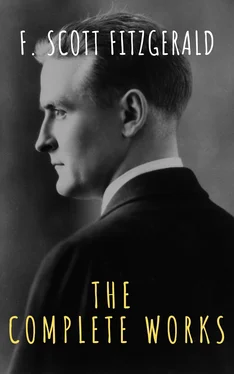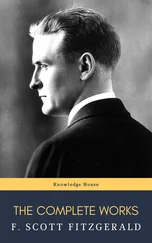When she finished they sat for a moment in silence, she draping the last skeins of a Welsh rabbit on her fork and waiting for him to speak.
“Let’s get out of here,” he said suddenly.
Marcia’s eyes hardened.
“What’s the idea? Am I making you sick?”
“No, but I don’t like it here. I don’t like to be sitting here with you.”
Without another word Marcia signalled for the waiter.
“What’s the check?” she demanded briskly. “My part—the rabbit and the ginger ale.”
Horace watched blankly as the waiter figured it.
“See here,” he began, “I intended to pay for yours too. You’re my guest.”
With a half-sigh Marcia rose from the table and walked from the room. Horace, his face a document in bewilderment, laid a bill down and followed her out, up the stairs and into the lobby. He overtook her in front of the elevator and they faced each other.
“See here,” he repeated, “you’re my guest. Have I said something to offend you?”
After an instant of wonder Marcia’s eyes softened.
“You’re a rude fella,” she said slowly. “Don’t you know you’re rude?”
“I can’t help it,” said Horace with a directness she found quite disarming. “You know I like you.”
“You said you didn’t like being with me.”
“I didn’t like it.”
“Why not?” Fire blazed suddenly from the gray forests of his eyes.
“Because I didn’t. I’ve formed the habit of liking you. I’ve been thinking of nothing much else for two days.”
“Well, if you——”
“Wait a minute,” he interrupted. “I’ve got something to say. It’s this: in six weeks I’ll be eighteen years old. When I’m eighteen years old I’m coming up to New York to see you. Is there some place in New York where we can go and not have a lot of people in the room?”
“Sure!” smiled Marcia. “You can come up to my ’partment. Sleep on the couch, if you want to.”
“I can’t sleep on couches,” he said shortly. “But I want to talk to you.”
“Why, sure,” repeated Marcia—“in my ’partment.”
In his excitement Horace put his hands in his pockets.
“All right—just so I can see you alone. I want to talk to you as we talked up in my room.”
“Honey boy,” cried Marcia, laughing, “is it that you want to kiss me?”
“Yes,” Horace almost shouted. “I’ll kiss you if you want me to.”
The elevator man was looking at them reproachfully. Marcia edged toward the grated door.
“I’ll drop you a post-card,” she said.
Horace’s eyes were quite wild.
“Send me a post-card! I’ll come up any time after January first. I’ll be eighteen then.”
And as she stepped into the elevator he coughed enigmatically, yet with a vague challenge, at the ceiling, and walked quickly away.
He was there again. She saw him when she took her first glance at the restless Manhattan audience—down in the front row with his head bent a bit forward and his gray eyes fixed on her. And she knew that to him they were alone together in a world where the high-rouged row of ballet faces and the massed whines of the violins were as imperceivable as powder on a marble Venus. An instinctive defiance rose within her.
“Silly boy!” she said to herself hurriedly, and she didn’t take her encore.
“What do they expect for a hundred a week—perpetual motion?” she grumbled to herself in the wings.
“What’s the trouble, Marcia?”
“Guy I don’t like down in front.”
During the last act as she waited for her specialty she had an odd attack of stage fright. She had never sent Horace the promised post-card. Last night she had pretended not to see him—had hurried from the theatre immediately after her dance to pass a sleepless night in her apartment, thinking—as she had so often in the last month—of his pale, rather intent face, his slim, boyish figure, the merciless, unworldly abstraction that made him charming to her.
And now that he had come she felt vaguely sorry—as though an unwonted responsibility was being forced on her.
“Infant prodigy!” she said aloud.
“What?” demanded the negro comedian standing beside her.
“Nothing—just talking about myself.”
On the stage she felt better. This was her dance—and she always felt that the way she did it wasn’t suggestive any more than to some men every pretty girl is suggestive. She made it a stunt.
“Uptown, downtown, jelly on a spoon,
After sundown shiver by the moon.”
He was not watching her now. She saw that clearly. He was looking very deliberately at a castle on the back drop, wearing that expression he had worn in the Taft Grill. A wave of exasperation swept over her—he was criticising her.
“That’s the vibration that thr-ills me,
Funny how affection fi-lls me,
Uptown, downtown——”
Unconquerable revulsion seized her. She was suddenly and horribly conscious of her audience as she had never been since her first appearance. Was that a leer on a pallid face in the front row, a droop of disgust on one young girl’s mouth? These shoulders of hers—these shoulders shaking—were they hers? Were they real? Surely shoulders weren’t made for this!
“Then—you’ll see at a glance
“I’ll need some funeral ushers with St. Vitus dance
At the end of the world I’ll——”
The bassoon and two cellos crashed into a final chord. She paused and poised a moment on her toes with every muscle tense, her young face looking out dully at the audience in what one young girl afterward called “such a curious, puzzled look,” and then without bowing rushed from the stage. Into the dressing-room she sped, kicked out of one dress and into another, and caught a taxi outside.
Her apartment was very warm—small, it was, with a row of professional pictures and sets of Kipling and O. Henry which she had bought once from a blue-eyed agent and read occasionally. And there were several chairs which matched, but were none of them comfortable, and a pink-shaded lamp with blackbirds painted on it and an atmosphere of rather stifled pink throughout. There were nice things in it—nice things unrelentingly hostile to each other, offsprings of a vicarious, impatient taste acting in stray moments. The worst was typified by a great picture framed in oak bark of Passaic as seen from the Erie Railroad—altogether a frantic, oddly extravagant, oddly penurious attempt to make a cheerful room. Marcia knew it was a failure.
Into this room came the prodigy and took her two hands awkwardly.
“I followed you this time,” he said.
“Oh!”
“I want you to marry me,” he said.
Her arms went out to him. She kissed his mouth with a sort of passionate wholesomeness.
“There!”
“I love you,” he said.
She kissed him again and then with a little sigh flung herself into an armchair and half lay there, shaken with absurd laughter.
“Why, you infant prodigy!” she cried.
“Very well, call me that if you want to. I once told you that I was ten thousand years older than you—I am.”
She laughed again.
“I don’t like to be disapproved of.”
“No one’s ever going to disapprove of you again.”
“Omar,” she asked, “why do you want to marry me?”
The prodigy rose and put his hands in his pockets.
“Because I love you, Marcia Meadow.”
And then she stopped calling him Omar.
“Dear boy,” she said, “you know I sort of love you. There’s something about you—I can’t tell what—that just puts my heart through the wringer every time I’m round you. But, honey—” She paused.
“But what?”
“But lots of things. But you’re only just eighteen, and I’m nearly twenty.”
Читать дальше












